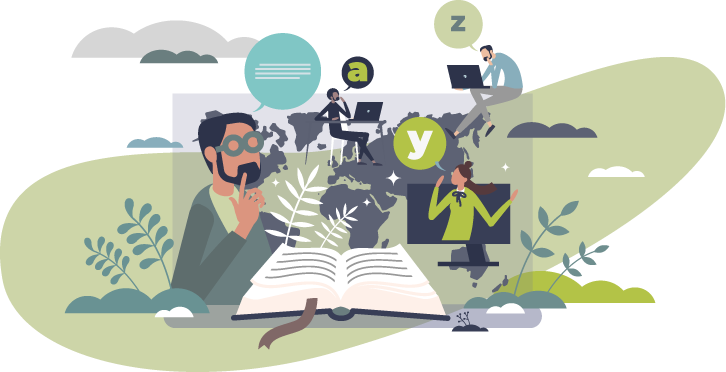
Words
It has never been just about words. For a translation service to be comprehensive, it needs to take into account everything that makes a simple text into content with value.
We convey meaning and content, with our specialised translators and eagle-eyed revisers.
We take care of form and style, with our focus firmly on the writer and the reader.

-
Translation

Not all translations are the same. It is important to entrust any project – large or small – to specialised translators who are experts in the language and the industry for which the text is intended. Habits, choices, styles and techniques all vary from one industry and one language to another. Our job is to know how to successfully navigate and explore all of these variables.
Specialised translation requires collaboration between people with complementary skills: our translators are experienced professionals who translate exclusively in their areas of expertise. Their work is always checked by revisers, because four eyes are better than two. Project managers are responsible for coordinating and packaging the finished project. -
Proof-reading

If a text is going to be published, either online and as a hard copy, it is extremely important to check the final layout before printing or publishing it. This applies to the source text as well as to translations: this check is called proof-reading.
The formatting of a translated text is a delicate stage during which errors or problems may arise that are difficult to spot without a good command of the language.
Drafts are checked for typos and errors in formatting or punctuation. If the text is translated into more languages, checks are made for consistency in translation choices and layout in all versions.
It is also possible that once formatted, the translated text may not be vivid enough, it may be too long or too short or not in keeping with the images chosen.
In this case too revisers are involved to correct any small flaws and apply the finishing touches so that websites, brochures, books and catalogues can achieve their final shape.
-
Pre-editing

A translation can only do its job properly if the source text is clear, legible, accurate and well-structured. Starting the translation process by revising the source text can be just what the original and translated text need, and also prepares the text for automatic translation, rendering it more effective.
Before translation begins, a source text deserves to receive proper treatment: we correct any typos, check the order of the information, and improve the style. We standardise the terminology, ironing out any ambiguities. We can focus on a single issue or on the form of the text as a whole. Just as we do with our translations, we refresh and tidy up the source text as well, to make your words shine.
Then, when we translate them, we take them into other languages and other worlds. -
Post-editing

Automatic translation can deliver translations with extremely short turnarounds and an acceptable level of quality for certain communication purposes. It is the right solution when large volumes of text need to be translated quickly, or when translation is for in-house use only. Automatic translation tools can produce results that look good, but which always need an overall check by an expert, critical eye. This is why post-editing is necessary, i.e. a review by a professional to ensure that the text is accurate, the content corresponds with the original, and the terminology is uniform throughout. It is crucial to assess with a professional whether the text and languages are suitable for automatic translation, which tools to use, and what level of quality the post-editing should aim for. Our business tools enable us to produce and revise automatic translations in confidential environments that are suitable for managing and editing large volumes in short turnarounds, with skilled personnel specifically trained in this work.
-
Certified translation

If you need to translate an official document to be submitted to Italian or foreign authorities, you usually need a certified translation.
In Italy, translations take on legal value through an oath sworn before a Court official or a Notary. The translator certifies that he or she has faithfully translated the original document and accepts civil and criminal liability for what has been translated.
A certified translation is required, for example, for corporate documents, notarial deeds and certifications. It is also required for personal documents such as certificates of vital records, driving licences, powers of attorney, academic qualifications, wills, etc.
We take care of all the paperwork, navigating the Italian bureaucracy without overlooking a single detail.
Take a look at our Guide to Certified Translations.
Guide to Certified Translations
Contact us for a custom quote
Contattaci